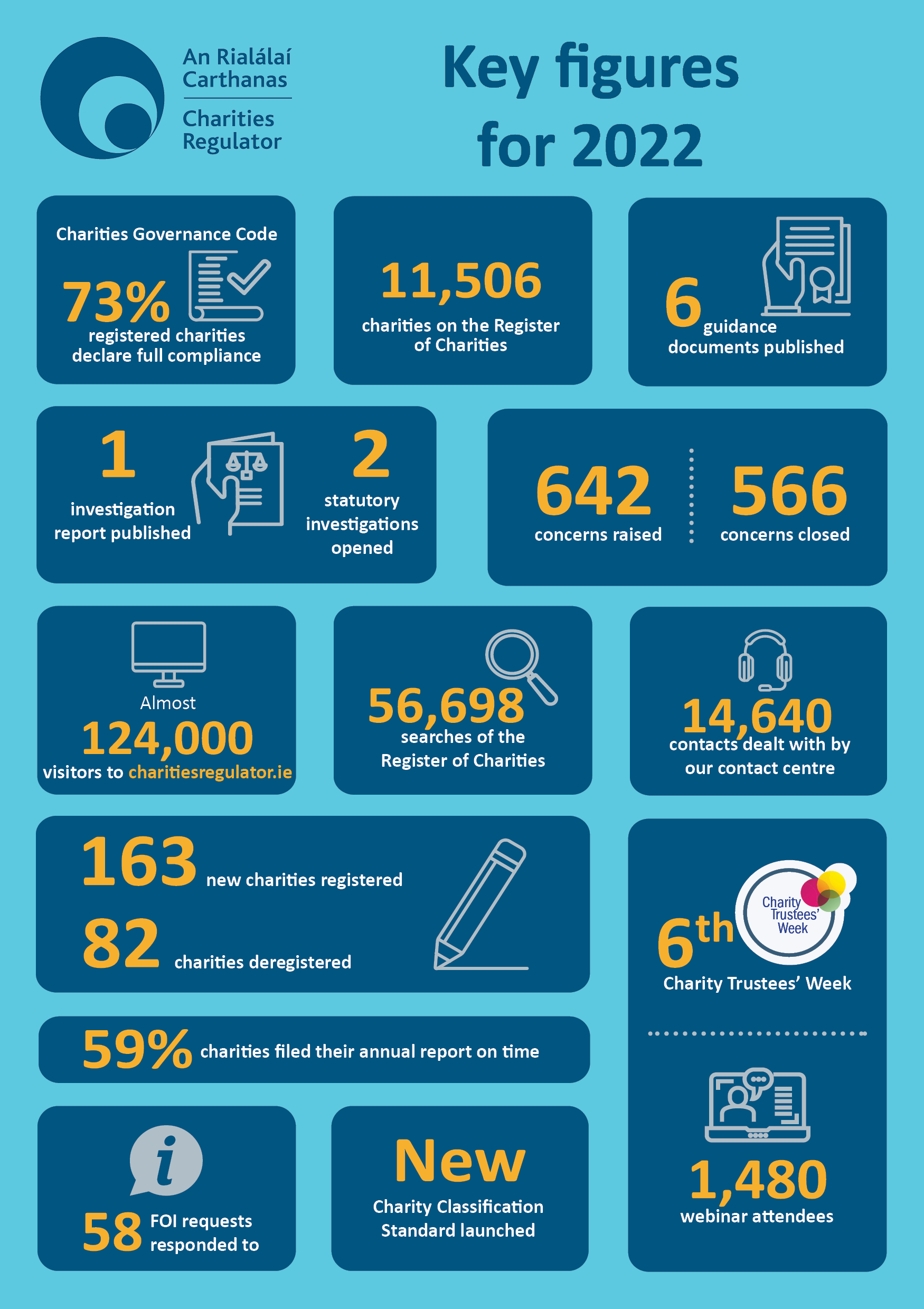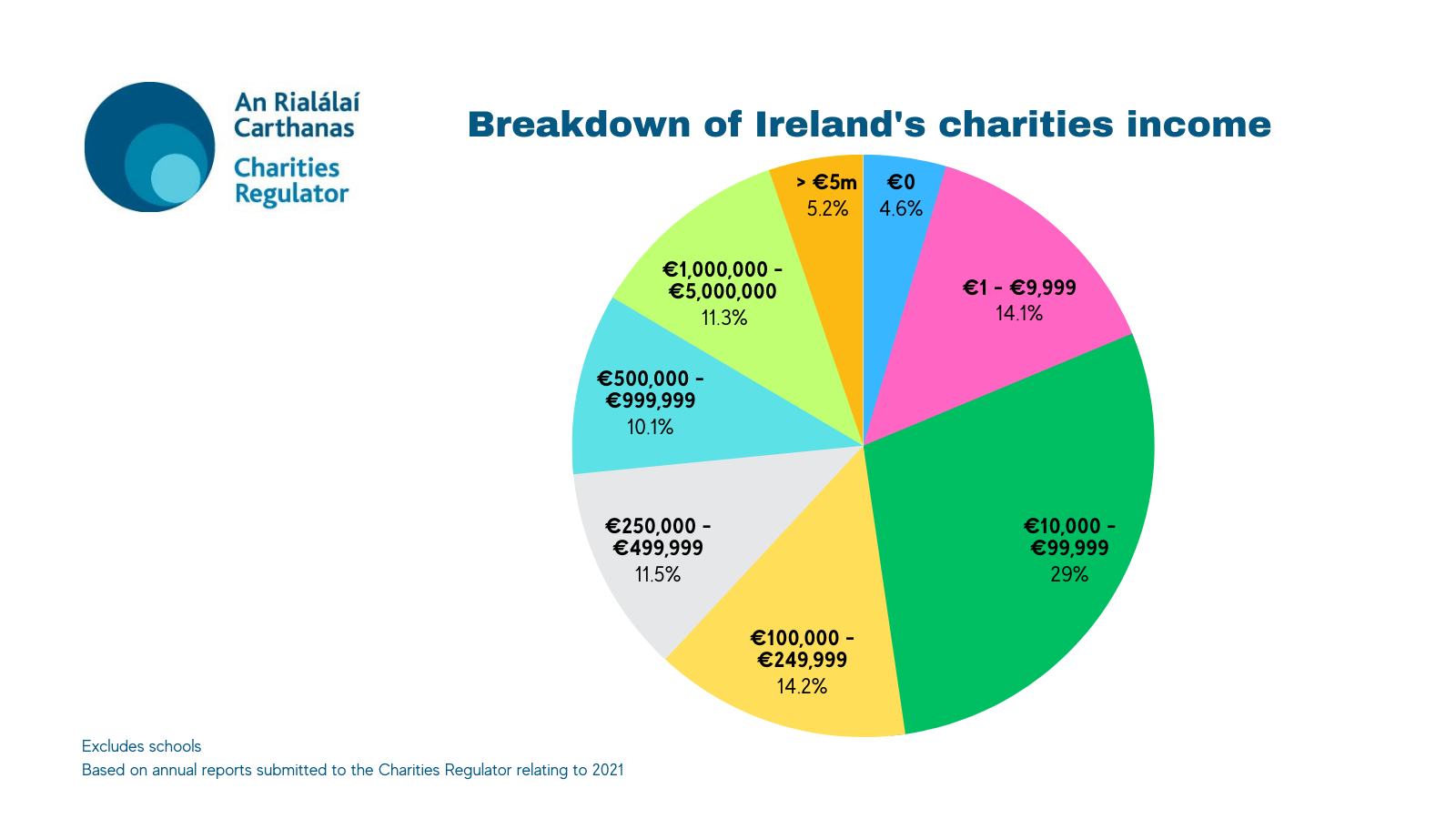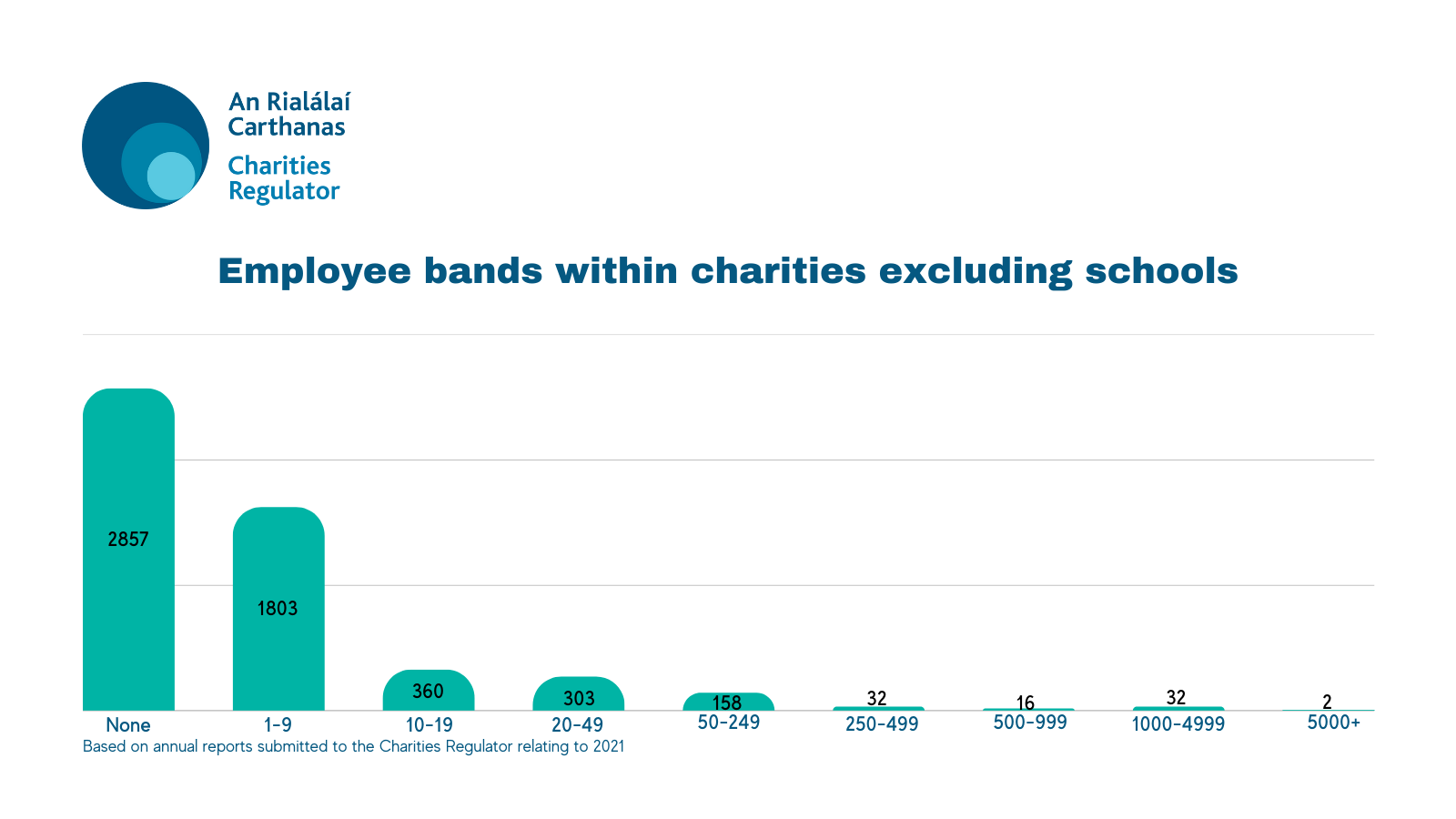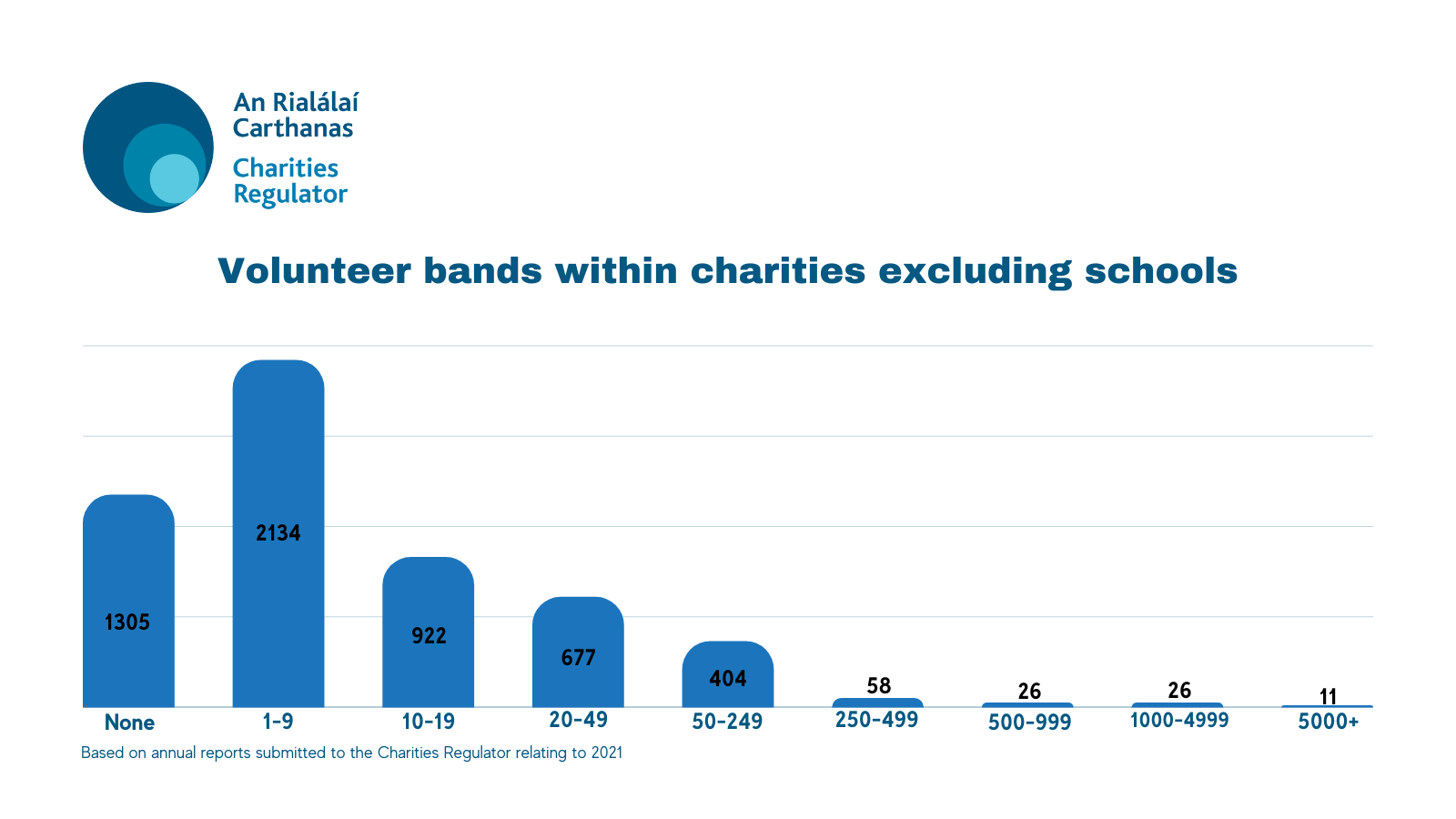- 11,506 charities operating in the State last year
- Almost 75% declare full compliance with Charity Governance Code
- Just 59% filed an annual report on time
Governance standards continue to improve across the charity sector, the Charities Regulator’s Annual Report for 2022 shows. Almost three-quarters (73%) of charities said they were fully compliant with the Charities Governance Code, which sets out the minimum standards that a charity should meet for it to be effectively managed and controlled. There were 11,506 charities operating in the State last year according to the report, which was published today.
While overall governance standards continue to improve within the sector, many charities still need to do more to meet their obligations under the Charities Act 2009. Only 59% of charities filed an annual report on their finances and activities to the Regulator on time during 2022, despite all charities being required by law to file one within 10 months of their financial year-end. The contents of these reports are published on the Register of Charities and provide essential information to help inform donors and the general public. By the end of 2022, a further 14% of charities had filed annual reports with the Regulator, bringing the total number of reports submitted to 73%, which was a 5% decrease year-on-year.
“It is very disappointing to see charities fail to comply with their obligations to complete and file an annual report on time with the Regulator,” according to Helen Martin, Chief Executive of the Charities Regulator. “This report provides a vital window into a charity’s work for the general public and for potential donors and volunteers. And, for the many charities that file on time, it demonstrates a commitment to transparency and accountability to their supporters and the wider public.”
The Charities Regulator is currently engaged in a targeted compliance and enforcement initiative in order to bring non-compliant charities into compliance where possible. “In the interests of the public and out of fairness to the majority of charities that submit their annual reports on time each year, we have signalled to the sector that we will deal decisively with those charities that have repeatedly failed to file annual reports in a timely manner,” Ms Martin said.
“There is a clear and direct link between public trust in the charity sector and transparency and accountability within the sector,” said Ms Martin. “As a regulator, we strive to assist charities in meeting their regulatory requirements, but ultimately, it is charities and their trustees who are best placed to ensure they are meeting their legal obligations and operating transparently and in an appropriate manner at all times.”
The Charities Regulator received an average of 12 concerns per week last year in relation to the over 11,500 Irish charities that it regulates. The majority of concerns are dealt with through engagement with the organisation and without utilising any statutory powers. About one-third of the 642 concerns raised related to governance issues, while one-third related to questions relating to the legitimacy of a specific charity. Other issues that were raised by members of the public included questions around financial control and transparency and queries in relation to potential private benefit from charity activity. Two statutory investigations were opened into charities during the year, and the Regulator published one inspectors’ report.
The number of concerns, which are typically raised by members of the public, increased by 13% in 2022. Ms Martin said it was likely that the increase in concerns raised last year was partly related to the re-opening of society post pandemic during 2022. “Not all concerns raised with us relate to registered charities, the vast majority of which work very hard to meet their charitable purpose in compliance with charity law, and to run their charities well in accordance with the standards set out in the Charities Governance Code. However, matters can sometimes arise which lead to concerns regarding a registered charity, and in these cases, it is essential that members of the public know that they can raise concerns with the Regulator.”
Ms Martin added that if someone wanted information in relation to a specific Irish charity, they should check the Register of Charities, which can be found on the Charities Regulator website and also via checkacharity.ie. “We would strongly encourage all donors and potential donors to check the Register of Charities. It allows the public to check whether an organisation is a registered charity and if it is, can provide details of its purpose, finance and activities, trustees (also known as directors or committee members) and key documents.”
The Annual Report notes that during 2022, the Charities Regulator undertook a number of initiatives to raise public awareness of its activities, including the Register of Charities, and to promote informed giving. “The survey of public attitudes towards charities, which we commissioned in late 2022, found that more people believed that having trust and confidence in a charity was very important when deciding to donate than when a similar study was undertaken in 2020 (80% vs 65%). Increasing the public’s awareness that they can use the Register to check on a charity’s finances and activities before deciding to donate to it, will help to increase trust and confidence in the transparency and accountability of charities and this will benefit the entire sector,” Ms Martin said.
Speaking on the publication of the Annual Report, Minister Joe O’Brien TD, Minister of State with responsibility for Community Development and Charities, said: “The activities outlined in the 2022 Report underline the important and necessary functions of the Regulator in helping to strengthen public confidence in the charities sector, enhance compliance measures and ensure proportionate regulation. With over 11,500 charities on the Register, the work of the Regulator continues to increase. In this regard, the advancement of the Charities (Amendment) Bill 2023 will be integral in underpinning the continued strengthening of the charity sector. I would like to take the opportunity to thank the Chair and the Board of the Regulator, and the management and staff, for their hard work and dedication throughout 2022.”
Charities Regulator Chairman, Paddy Hopkins, highlighted the new charity classification standard introduced by the organisation last year, which enables registered charities to identify themselves by their main activities and thereby allow for the categorisation of charities.
“Publishing this classification information on the Register of Charities will make it easier for the public and funders to identify charities focussing on charitable purposes which are of interest to them. With recent research on the sector showing that securing funding continues to be one of the greatest challenges facing charities, this could also be a valuable benefit to charities that complete their classification. Classification will also improve understanding of the charity sector generally, by enabling the production of better statistics and information for comparison and study purposes.”
Mr Hopkins said that Charities Regulator had worked with the Department of Rural and Community Development to progress the Charities (Amendment) Bill, and added that its passing “will level the playing field as far as financial reporting is concerned and greatly enhance the Regulator’s ability to ensure greater transparency and accountability in relation to registered charities while also improving the range of regulatory tools available to it to ensure proportionate and effective regulation”.
The 2022 Annual Report is available on the Charities Regulator’s website.





